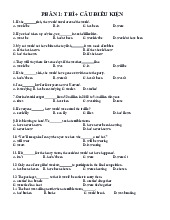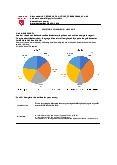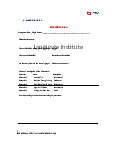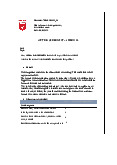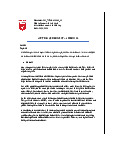





Preview text:
I. Comple the sentences by using either the present simple or the present progressive of the verbs in the box
Bite bleed flow rain leave grow belong take seem shine wake
1. The River Nile ________ into the Mediterranean.
2. This book is mine. That one _______ to Pierre.
3. Look at Joan. She ________ her fingernails. She must be nervous.
4. We usually _______ vegetables in our garden.
5. Let's go out. It (not) ________ now.
6. Every morning, the sun _________ in my bedroom window and me up.
7. Jim is very untidy. He (always) __________ his things all over the place.
8. Ann ___________ very happy at the moment.
9. He's a photographer. He ________ a lot of photos.
10. Oh! What's the matter with your hand? It _______
II. Put the verb in the correct form, present simple or present progressive.
1. A: What ____________ (you/ do)?
B: I _________ (write) to my parents. I __________ (write) to them every weekend.
2. A: Look, it _________(snow).
B: It's beautiful! This is the first time I've ever seen snow. It ___ (not snow) in my country.
14. A: I ________ (always/ fall) asleep. I just can't keep awake.
B: What time __________ (you/ go) to bed?
A: About ten o'clock usually. But it ___________ (not/ make) any difference.
15. A: Why ___________ (you/ want) to change the whole plan? B: I'm just not happy with it.
A: And I ________ (not/ understand) why you ________ (be) so difficult aboutit.
III. Put the verbs into the suitable form, the present perrect or the present perfect progressive.
1. A: How long ________ (you/ study) English?
B: I _________ (learn) English since I was twelve.
2. A: Are you waiting for someone?
B: Yes, I _______ (wait) for two hours, but my friend__________ (not come) yet.
3. А: I _____ (lose) my address book. ______(you/ see) it anywhere?
B: Yes. I _______ (just/ see) it on the bookshelf.
4. A: You look tired. _____ (you/ work) so hard?
B: Yes. I _____ (study) for four hours and probably won't finish until midnight.
5. А: ______ (you/ see) Mark recently?
B: No, I _____ (not/ see) him since Christmas, I wonder where he ______ (live) since then. 6. A: I feel really tired.
B: It's because you _____ (do) too much.
A: Well, at least I _____ (finish) that report now, and I can relax.
7. A: Someone_____(leave) the ladder outside, look.
B: I expect that's Mike. He _____ (clean) the windows. I don't think he _____ (finish) yet.
8. A: You've got mud on your shoes.
B: It's all right, I'll take them off. I______ (work) in the garden.
A: Yes, it looks a lot tidier. Well done. You _____ (do) a good job.
9. A: I _______ (hear) that you and Harriet are building a garage. How long _____ (you/ do) that?
B: Oh, for about a month now. We_____(do) about half of it.
10. A: You're still reading that book, aren't you? How long_______(you/ read) it?
B: I______(read) it for three days, but I _______ (not/ finish) it yet.
11. A: How long ________ (you/ know) Jane?
B: We __________ (know) each other for over ten years.
12. A: _____ (John/ always/ live) in London?
B: No, he _______ (live) in London for the last few years.
IV. Suply the correct verb form: Present tenses.
1. Listen! I _________(think) someone ______ (knock) at the door.
2. We _____ (not/ know) why Sarah is upset, but she ______ (not/ speak) to us for ages.
3. The earth ______ (circle) the sun once every 365 days.
4. Why ______ (you/ stare) at me? I suppose you _____(not/ see) a woman on a motorbike before!
5. How many times _____ (you/ see) him since he went to Edinburgh?
6. Trevor and Laura like Scabble. They_____(play) it most evenings.
1. The number of vehicles on the road ______(increase).
8. Sorry I'm late? "That's all right. I ______ (not/ wait) long.
9. Mrs Green always ______ (go) to work by car, but this week she ______(travel) by bus.
10. We ______(be) from French. We____(be) there for 20 years.
11. These flowers are dying. You _______(not/ water) them for ages.
12. Mai _______(lose) her keys, so she can't get into the house.
13. I'm afraid I _____ (not/ finish) typing those letters yet. I ______(deal) with customers all morning.
14. A: What _______ (your father/ do)?
B: He _______ (be) an architect but he ________ (not/work) at the moment.
15. A: ________ (you/ ever/ see) a lion?
B: Yes, I _________ (see) it since I was a child.
V. Fill in the gaps in this letter with suitable verbs. Use the present perfect progressive or
simple, or the present progressive or simple. Dear Francesca,
We (1) are having a wonderful time here in York. We (2) ________ here for three days now and we
(3) _____ to stay for the rest of the week because we (4)______ourselves so much. We (5) ____the
Cathedral and the Castle Museum and this morning we (6) _____around the little old-fashioned
streets, looking at the shops and cafes. I'm writing this while we stop for a cold drink before lunch.
We (7) _____much money yet but we'll get some souvenirs before we leave. Besides the sightseeing,
we some exercise. The countryside around York is lovely and we (9) _____some lovely long walks.
Fortunately, the weather (10) _____ very good so far. People (11) ____ it can be very cold and it
often (12) _____cfor days! As this is the first time I (13) ______ to England. I (14) ___ I'm just lucky. See you soon, Roberta
VI. Use the words given to make sentences. Do not change the order of the words. Use only the
past simple or the past progressive. 1
when Don/ arrive/ we/ have/ coffee 2
he/ sit down/ on a chair/ while/ I/ paint/ it 3
the students/ play/ a game/ when/ professor/ arrive 4
Felix/ phone/ the fire brigade/ when the cooker/ catch/ fire 5
while/ he/ walk/ in the mountains/ Henry/ see/ a bear 6
when the starter/ fire/ his pistol/ the race/ begin 7
I/ walk/ home/ when it/ start/ to rain 8
when/ Margaret/ open/ the door/ the phone/ ring 9
he/ sit/ in the garden/ when/ a wasp/ sting/ him/ on the nose 10
while/ he/ run/ for a bus/ he/ collide/ with a lamp post 11
Vicky/ have/ a beautiful dream/ when/ the alarm clock/ ring 12
when/ Alex/ see/ the question/ he/ know/ the answer/ immediately 13
the train/ wait/ when/ we/ arrive/ at the station 14
Sarah/ have/ an electric shock/ when/ she/ touch/ the wire 15
when/ the campers/ wake/ they/ see/ the sun/ shine
VII. Put the verbs into the correct form, past progressive or past simple.
1. When Martin_______(arrive) home, Ann____ (talk) to someone on the phone.
2. It ____(be) cold when we_____(leave) the house that day, and a light snow ____(fall).
3. I____(call) Roger at nine last night, but he (not/ be) at home. He __(study) at the library.
4. I ___(see) Sue in town yesterday but she___(not/ see) me. She___(look) the other way.
5. When I____(open) the cupboard door, a pile of book ___(fall) out.
6. A: How___(you/ break) your arm?
B: I___(slip) on the ice while I___(cross) the street in front of the dorm.
7. A: What___(you/ do) this time yesterday?
B: We ____ (drive) to London, but on the way we___(hear) about abomb scare in Oxford Street.
So we____(drive) back home straightaway.
8. I____(meet) Tom and Ann at the airport a few weeks ago. They (go) to Berlin and I____(go) to
Madrid. We______(have) a chat while we___(wait) for our flights.
9. I___(cycle) home yesterday when suddenly a man the road in front of me. I___(step) out into
___(manage) to stop in time and ___(go) quite fast but luckily I ___(not/ hit) him.
10. Flight 2001____(fly) from London to New York when it suddenly____(encounter) turbulence and
___(drop) 15,000 feet. The plane ____(carry) over 300 passengers and a crew of 17.
11. While divers ____(work) off the coast of Florida, they___(discover) a 100-year-old shipwreck.
The shipwreck__(contain) gold bars worth $2 million. The divers ___(film) life on a coral reef when they ___ (find) the gold.
12. A man was fined $4,00 for stealing an ambulance. The ambulance driver __(make) a phone call
when the thief ___ (start up) the ambulance. He__(speed) away when the driver___(see) him and ___ (call) the police.
13. Police got a shock when they____ (stop) a motorist as she __(speed) on the highway. While they
____(search) the trunk of her car, they __(find) three snakes. The driver said she__(take) them to a pet fair.
14. Last night when we __(come) down the hill into town, we__(see) a strange object in the sky. It
just suddenly ___(appear) in front of us. We___(stop) the car and___(get) out. As we___(watch) it, it
suddenly ___(fly) away and ___(disappear).
15. It was my first day of class. I ___(finally/ find) the right room. The room____(already/ be) full of
students. On one side of the room, students ___(talk) busily to each other in Spanish. Other
students___(speak) Japanese, and some ___(converse) in Arabic. It sounded like the United Nations.
Some of students, however, ____(just/ sit) quietly by themselves. I____(choose) an empty seat in the
last row and ____(sit) down. In a few minutes, the teacher ____(walk) into the room and all the
multilingual conversation ___(stop).
VIII. Choose the correct form of the verbs
Andy: Hello, Jane. What (1) are you doing/ do you do in this part of London?
Jane: Well, (2) I'm looking/ I look at flats round here.
Andy: Flats? (3) Are you wanting/ Do you want to move?
Jane: Yes, in fact, Adam and I (4) are getting/ get married.
Andy: That's great! Congratulations. When (5) have you decided/ did you decide?
Jane: Only last week. It was while we (6) were staying/ stayed with his family in Scotland. Now (7)
we try/ we're trying to find a suitable flat.
Andy: It’ll be greatto have you as neighbours. (8) I hope/ I'm hoping you manageto buy one soon.
Jane: Oh, we (9) aren't looking/ don't look for one to buy. We (10) aren't having/ don't have enough
money yet. (11) We're wanting/ We want to find somewhere to rent.
Andy: Yes, of course. That's what we (12) have been doing/ did at first. Actually in the end my
brother (13) was lending/ lent us some money. That's how we (14) were managing/ managed to buy ours.
Jane: Really? Perhaps I'll talk to my family before we (15) choose/ have chosen a fat.
Andy: That's not a bad idea. My family (16) gave/ were giving us quite a lot of helpul advice. Now,
what about a coffee? There's a good place just round the corner.
Jane: Oh, yes, I (17) looked/ was looking for somewhere to sit down when I (18) bumped/ have bumped into you. Let's go.
IX. Put the verbs in brackets in the correct form, past simple or present perfect.
1.I __(have) this shirt for nearly four years.
2. Joanna ___(tidy) her desk, but now it's in a mess again.
3. Mike ___(lose) his key. He can't find it anywhere.
4. The last time I ___(go) to Brighton was in August.
5. I ___(finish) my homework. I ___(do) it before tea.
6. And the race is over! And Micky Simpson ___ (win) in a record time!
7. Martin ____(be) to Greek five times. He loves the place.
8. Of course I can ride a bike. But I ___ (not/ ride) one for years.
9. I don't know Carol's husband. I ___(never/ meet) him.
10. Rupert ___(leave) a message for you. He ___(ring) last night.
11. Your car looks very clean. ___(you/ wash) it?
12. We __(move) here in 1993. We__(be) here a long time now.
13. Mr Clack ___ (work) in a bank for 15 years. Then he gave it up.
14. Is this the first time you ____ (cook) pasta?
15. I ___ (work) for a computer company since I ___(graduate) from university.
16. We ___ (post) the parcel three weeks ago. If you still ___ (not/ receive) it, please inform us immediately.
17. Albert Einstein __(be) the scientist who __ (develop) thetheory of relativity.
18. My grandfather ___ (die) 30 years ago. I ___(never/ meet) him. 19. A: Is your father at home?
B: No, I'm afraid he __(go) out.
A: When exactly ___(he/ go) out? B: About ten minutes ago. 20. A: Where do you live? B: Boston.
A: How long ___(you/live) there. B: 5 years.
A: Where ___(you/ live) before that? B: Chicago.
A: How long (you/ live) in Chicago? B: 2 years.
X. Complete the conversation. Put the verbs in brackets in the past simple or present perfect.
Tom: (1)____ (you/ hear) the news about David?
Harriet: No. (2)___ (what/ happen)?
Tom: (3) ___(he/ have) an accident. When he was walking down some steps, (4)__ (he/ fall) and (5)___ (break) his leg.
Harriet: Oh, how awful! When (6)___ (it/ happen)?
Tom: Yesterday afternoon. Melanie (7)___ (tell) me about it last night.
Harriet : Last night! (8)___ (you/ know) about it last night, and (9) ___(you/ not/ tell) me!
Tom: Well, (10)___(I/ not/ see) you last night. And (11) ___(I/ not/ see) you today, until now.
Harriet: I hope he's all right. (12)___(he/ have) lots of accidents, you know. (13) ____(he/ do) the same thing about two years
XI. Read this letter to a newspaper. Then look at the answer below and write the correct answer in each space.
A few days ago I (1) _- that someone plans to knock down the White Horse Inn. This pub (2)__ the
center of village life for centuries. It (3)__ at our crossroads for 500 years. It (4) __ famous in the old
days, and Shakespeare once (5)___there, they say. I (6)__ in Brickfield all my life. The villager (7)__
about the plans for less than a week and already there's a 'Save Our Pub' campaign. Last week we
(8)___happy, but this week we (9)___angry. We (10) ___ them, you’ll see. 1. a. had learned b. learned c. has learned d. learn 2. a. has been b. had been c. was d. is 3. a. stood b. is standing c. stands d. has stood 4. a. has been b. is c. was d. had been 5. a. had stayed b. stayed c. stays d. has stayed 6. a. lived b. am living c. was d. have lived 7. a. have known b. knew c. had known d. know 8. a. are being b. has been c. were d. had been 9. a. are b. were c. has been d. are being 10. a. are b. will stop c. stop d. are going to stop
XII. Put the verbs in the present perfector past perfect. Sometimes you need the negative.
1. Who is that woman? I ___(never/ see) her before.
2. The house was dirty. They ___(clean) it for weeks.
3. There was no sign of a taxi, although I __ (order) one half an hour before.
4. You can have that newspaper. I ___(finish) with it.
5. We went to the box office at lunch-time, but they __(alreadyl sell) all the tickets.
6. It isn't raining now. It__(stop) at last.
7. It'll soon get warm here. I ___(turn) the heating on.
8. It was twenty to six. Most of the shops ___(just/ close).
9. Karen didn't want to come to the cinema with us because she __(already/ see) the film.
10. There's no more cheese. We _(eat) it all, I'm afraid.
11. I'm very pleased to see you again after such a long time. We_ (see) each other for five years.
12. I spoke to Melanie at lunch-time. Someone __(tell) her the news earlier.
13. By 1960 most of Britain's old colonies __(become) independent.
14. Don't you want to see this program? It_(start).
15. At first I thought I __ (do) the right thing, but I soon realised that l __(make) a serious mistake.
XIII. Put the verbs into the correct form, past simple or past perfect.
1. The house was very quiet when I __(get) home. Everybody __(go) to bed.
2. The apartment was hot when I got home, so I ___(turn) on the air conditioner.
3. А: ___(you/meet) Tom at the party last night?
B: No, he __(already go) home when I __(arrive) the party.
4. I ___(feel) a little better after I ___(take) the medicine.
5. I was late. The teacher ___ (already/ give) a quiz when I ___(get) to class.
6. It was raining hard, but by the time the class ___(be) over, the rain __(stop).
7. When I saw that Mike was having trouble, I ___(help) him. He ___(be) very appreciative.
8. We were driving along the road when we ___(see) a car which ___(break) down, so we __(stop) to see if we could help.
9. We___(arrive) at work in the morning and __(find) that somebody ___ (break) into the office
during the night . So we __(call) the police.
10. Yesterday I ___ (go) to my daughter's dance recital. I ___(be/ never) to a dance recital before. I
___(not/ take) dancing lessons when I __ (be) a child.
